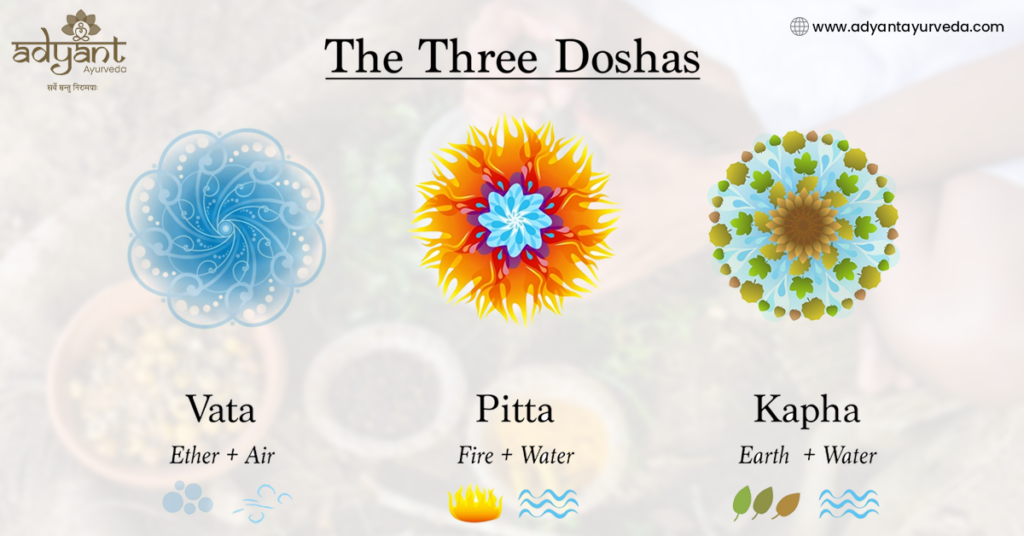Table of Contents
ToggleUnlocking Health & Harmony: A Complete Guide to Ayurvedic Doshas
Introduction
Do you often feel restless while your friend remains calm in the same situation? Have you noticed that some people digest food effortlessly while others struggle with bloating? According to Ayurveda, these differences stem from the three Doshas—Vata, Pitta, and Kapha. Understanding your Dosha is the key to achieving optimal health, balance, and overall well-being.
At Adyant Ayurveda, we specialize in helping individuals discover their unique Dosha constitution and provide personalized treatments to restore harmony in mind and body.
In this guide, we’ll explore:
-
The characteristics of each Dosha
-
How to identify your Dosha
-
Ayurvedic lifestyle and dietary recommendations
-
Remedies to balance each Dosha naturally
-
The role of Panchakarma in Dosha balance
What Are Ayurvedic Doshas?
The three Doshas—Vata, Pitta, and Kapha—are biological energies derived from the five elements (Earth, Water, Fire, Air, and Ether). Each individual has a unique combination of these Doshas, which determines their physical, mental, and emotional traits.
1. Vata Dosha (Air & Ether)
Characteristics:
-
Thin body structure, dry skin, cold hands and feet
-
Creative, energetic, quick thinker
-
Prone to anxiety, restlessness, and digestive issues (constipation, bloating)
Signs of Imbalance:
-
Insomnia, dry skin, digestive issues, joint pain
Balancing Vata:
-
Diet: Warm, nourishing foods like soups, stews, and cooked grains
-
Lifestyle: Establish a regular routine, practice grounding activities like yoga and meditation
-
Ayurvedic Herbs: Ashwagandha, Brahmi, and Triphala
-
Treatments: Abhyanga (oil massage), Shirodhara (oil pouring on the forehead)
2. Pitta Dosha (Fire & Water)
Characteristics:
-
Medium build, warm body temperature, and a sharp intellect
-
Passionate, ambitious, strong digestion
-
Prone to anger, inflammation, acidity, and skin rashes
Signs of Imbalance:
-
Acid reflux, excessive sweating, skin breakouts, irritability
Balancing Pitta:
-
Diet: Cooling foods like cucumbers, melons, and coconut water
-
Lifestyle: Avoid overworking, and practice calming activities like swimming and nature walks
-
Ayurvedic Herbs: Neem, Aloe Vera, Guduchi
-
Treatments: Pitta-reducing therapies like Virechana (detoxification)
3. Kapha Dosha (Earth & Water)
Characteristics:
-
Sturdy build, soft skin, calm and compassionate
-
Slow metabolism, steady energy, emotionally stable
-
Prone to weight gain, congestion, lethargy, and depression
Signs of Imbalance:
-
Sluggish digestion, excessive sleep, sinus congestion
Balancing Kapha:
-
Diet: Light, warm foods like steamed vegetables and spices
-
Lifestyle: Stay active, engage in stimulating exercises like cardio or dance
-
Ayurvedic Herbs: Ginger, Turmeric, Trikatu
-
Treatments: Udwarthanam (herbal powder massage), Swedana (steam therapy)
How to Determine Your Dosha
You can determine your Dosha through self-analysis or consultation with an Ayurvedic expert at Adyant Ayurveda. Here’s a simple checklist:
-
Do you have dry skin, anxiety, and irregular digestion? ? You might be Vata
-
Do you have warm skin, sharp focus, and a strong appetite? ? You might be Pitta
-
Do you gain weight easily, feel sluggish, and have soft skin? ? You might be Kapha
For an accurate assessment, consult our Ayurvedic doctors at Adyant Ayurveda.
Ayurvedic Remedies for Dosha Imbalance
Each Dosha imbalance can be corrected through specific Ayurvedic treatments:
-
For Vata Imbalance: Oil massages (Abhyanga), warm and moist foods, Ashwagandha
-
For Pitta Imbalance: Cooling therapies, coconut oil massage, Aloe Vera juice
-
For Kapha Imbalance: Dry brushing, stimulating herbs like ginger and black pepper
Panchakarma for Dosha Balance
Panchakarma is a powerful Ayurvedic detox that helps reset the Doshas. At Adyant Ayurveda, we offer:
-
Vamana (therapeutic vomiting) for Kapha detox
-
Virechana (purgation therapy) for Pitta detox
-
Basti (medicated enema) for Vata detox
? Call 9972541009 to book your personalized Panchakarma therapy at Adyant Ayurveda.
Conclusion
Understanding your Dosha is the key to unlocking better health, mental clarity, and emotional balance. By following an Ayurvedic diet, lifestyle, and treatments, you can live a harmonious and disease-free life.
Want to know your Dosha and get a personalized wellness plan? Visit Adyant Ayurveda today!
Frequently Asked Questions (FAQs)
1. Can my Dosha change over time?
Yes! While your Prakriti (natural constitution) remains the same, lifestyle, diet, and age can influence your Vikriti (current state of imbalance).
2. What happens if all three Doshas are imbalanced?
When all three Doshas are imbalanced, it can lead to chronic diseases. A personalized Ayurvedic treatment plan is essential to restore balance.
3. How can I book a consultation at Adyant Ayurveda?
Call 9972541009 or visit our nearest branch in Bangalore for an expert Ayurvedic consultation.
Additional FAQs on Ayurvedic Doshas
What Mudra harmonizes the three Doshas?
Surabhi Mudra, also called Kamdhanu Mudra, is highly effective in balancing Vata, Pitta, and Kapha, paving the way for spiritual and physical well-being.
Which Pranayama is best for Dosha balancing?
Nadi Shodhana (Alternate Nostril Breathing) is a Tridoshic Pranayama that balances all three Doshas while cleansing the body’s energy channels.
Which Dosha causes oily skin?
Kapha Dosha is responsible for excessive oiliness in the skin. Ayurvedic skin care can help maintain balance.
Which Dosha is linked to anxiety?
An aggravated Vata Dosha is the leading cause of anxiety, according to Ayurvedic experts at Adyant Ayurveda.
Adyant Ayurveda – Your Trusted Partner in Ayurvedic Healing









